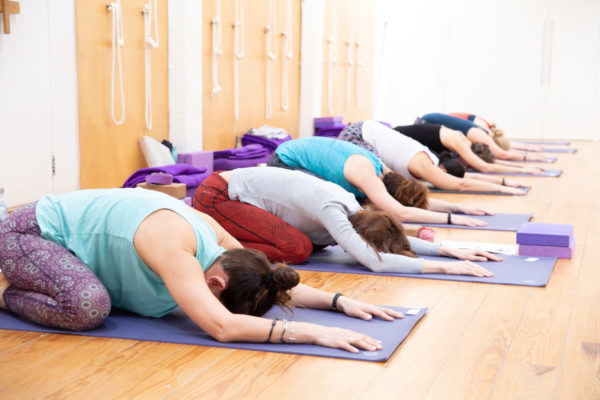How can Menopause Yoga help women with Premature Ovarian Insufficiency?

How can Menopause Yoga help women with Premature Ovarian Insufficiency?
Yoga can help women of all ages and stages of menopause, especially women with Premature Ovarian Insufficiency (POI).
Yoga is a holistic practice that both moves the body and calms the mind. It combines physical movement (known as poses) that stretch and strengthen the body, with breathing and meditation exercises that calm the nervous system and bring a sense of mental clarity and equilibrium. Unlike other forms of aerobic exercise, yoga has physical, mental and emotional benefits.
A regular yoga practice can help you reduce or eliminate some of the most common symptoms by reducing the stress trigger, as well as improving muscle strength and tone, which weaken in post menopause, balance, flexibility to prevent dangerous falls, and build bone density to help prevent osteoporosis.
One of the most transformational benefits of yoga and meditation is the effect they can have on your psychological state of mind and perspective, helping you to transition through this stage of upheaval in your life, and come to terms with the sense of grief that many of us experience for the loss of our fertility.
I know because I experienced many of these symptoms when I came through perimenopause in my early 40s at a time when it wasn’t as openly talked about as it is today.
The stress trigger:
During menopause, the adrenal system is put under considerable strain due to the peaks and troughs of our hormonal fluctuations and the seismic shift that follows the loss of estrogen and progesterone. Any additional stress in your life will trigger and exacerbate many menopause symptoms: hot flushes and anxiety attacks may increase in frequency and intensity; episodes of insomnia and sleep disturbance can become entrenched; fatigue, brain fog and low mood can become commonplace and debilitating.
Yoga, paced breathing and meditation release stress held in the body, and helps you to connect to the Parasympathetic Nervous System that enables you to ‘Rest and Digest’ thereby reducing anxiety, improving sleep and food digestion.
Muscles & Bones
The decline in estrogen and other hormones causes some of our muscles to turn to fat (hence the bingo wings and wobbly thighs), and calcium starts to leach out of our bones in post menopause. We need the muscles to support our skeletal structure and avoid debilitating falls. Many yoga poses help to retain muscles and the weight bearing balancing poses improve bone density.
Flexibility, Aches and Pains
Women in menopause commonly report aches and pains in their muscles and joints which become stiff and can be agonising. There is often no specific cause and painkillers may not relieve it. Frozen shoulder and hip or lower back pain are very common. Yoga deep stretches on a daily basis help to keep you flexible, mobile and can reduce symptoms.
What Style of Yoga is Good for Menopause?
There are many styles of modern yoga ranging from Hot Yoga (practiced in 40 degree heat) fast-paced Ashtanga and Power Yoga, relaxing Restorative and deep stretching Yin Yoga. There is even yoga for athletes, babies, backs, dogs …. you name it, there’s a yoga class for it! I would recommend avoiding hot yoga which increases the body temperature, even if you are not experiencing hot flushes at the time; it may trigger them. If you are feeling fatigued, throwing yourself into a challenging Power Yoga practice could put unnecessary stress on the body and in turn stress exacerbates other symptoms.
If you are new to yoga, then start by joining a Beginners or Level 1 Hatha yoga class, or look for a class that is designed to relieve stress. Once you are feel comfortable and calm, you can try other classes.
The most important thing is to find the right yoga class for you, with an experienced teacher you feel comfortable with, and to listen to what your body needs. Don’t make yoga another stressful part of your day, or else it will be counterproductive.
You can search for local classes and studios online, and the British Wheel of Yoga and Yoga Alliance have lists of experienced, professionally trained teachers on their websites.
Menopause Yoga
As a result of my personal experiences, in depth research and knowledge gained from being both a member of the British Menopause Society and the British Wheel of Yoga, I developed Menopause Yoga which is both an approach the menopause and a method that includes specially adapted yoga poses, breath work, mindful meditation and Cognitive Behaviour Therapy. I also include Wellbeing in these workshops, which cover menpause nutrition, natural remedies, vitamins and supplements, lifestyle changes you can make – as well as trusted medical advice from the BMS on HRT and other medical support available. This is important, because women need to be able to make informed choices about HRT, which can have many other health benefits.
Journal Writing:
Every woman is unique. The challenge lies in that women experience a variance of symptoms at different times, so being aware of how you are feeling and listening to your body is very important. Keeping a Journal is a very good way to chart your symptoms with your daily lifestyle, food, drinks, sleep patterns and work, to see if you can pinpoint your unique triggers, and how to avoid them.
Women’s Circles:
One of the most important parts of Menopause Yoga is having the opportunity to be with other women with POI, sharing your experiences, and supporting each other. This is why Women’s Circles are an integral part of my workshops, which women always tell me they love. Modern life quite disjointed lives.
Workshops and Teacher Training
I teach these workshops mainly in London, but also at Dr Louise Newson’s Menopause Centre in Stratford Upon Avon. These workshops have been very popular and welcomed by women who have asked me if there are any Menopause Yoga classes near where they live.
To meet this demand, I will be running more workshops across the UK in 2020, and this November 2019 I am launching the UK’s first Menopause Yoga & Wellbeing Teacher Training. The inaugural course will be held at Dr Newson’s centre with an introductory talk given by her. Dr Newson, who both takes HRT and practices yoga, encourages her patients to attend yoga classes on a weekly basis, for all of the benefits mentioned above.
My hope is that, in the very near future, there will be more professional yoga teachers who are qualified to lead Menopause Yoga classes so that more women can benefit from this wonderful holistic practice.
If you would like to host a workshop in a centre near where you live, or if you are a yoga teacher who would like to join her teacher training courses, please contact Petra by email: info@Mind-BodyYoga.co.uk.
Tel: 07590831966
Instagram: @Menopause_Yoga
